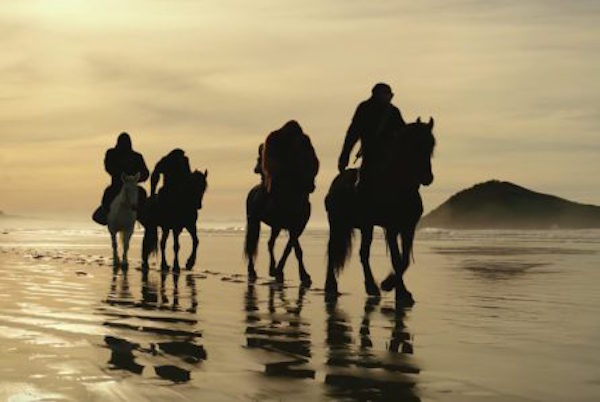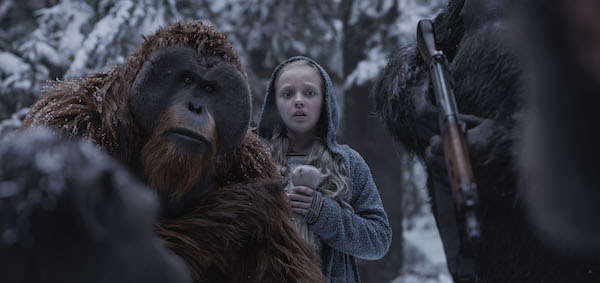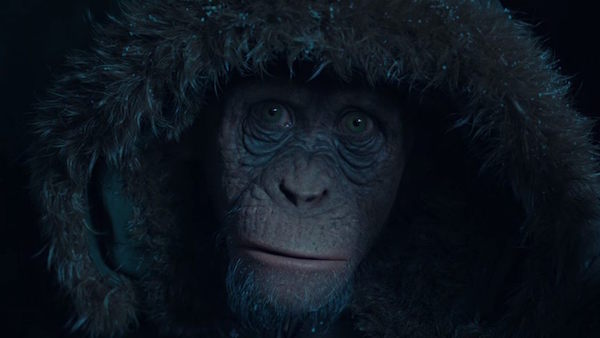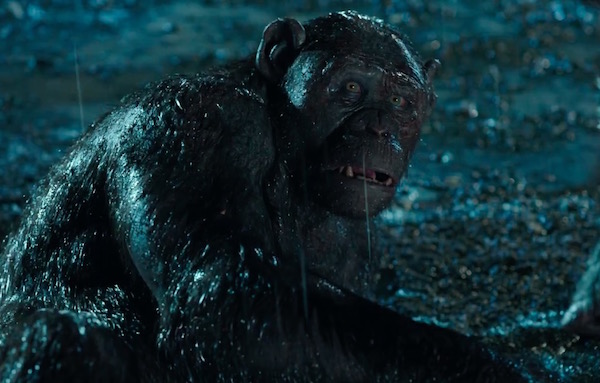War for the Planet of the Apes (d. Matt Reeves USA/Canada/New Zealand 2017)
Please read ‘On Reviews‘ for a guide to how I write film reviews. Any spoilers are appropriately marked and, though I personally prefer to know little about a film before seeing it, there is a synopsis at the bottom for any who wish to see one.
|
Entertainment: |
|
|
Performances: |
|
|
Predictability: |
|
|
Technical: |
|
Introduction
In the 1960s we had two films that really helped redefine Science Fiction films. One was Planet of the Apes (d. Franklin J. Schaffner USA 1968) (the other was 2001: A Space Odyssey (d. Stanley Kubrick USA/UK 1968)), it depicted the role reversal of apes and humans to comment on society. It’s sequels ran for a total of five films and explored the inverse, of apes amongst humans, as well as a way in which The Planet of the Apes could have all happened. Many years later Tim Burton would offer his reimagining of this classic film – Planet of the Apes – Planet of the Apes (d. Burton USA 2001). Tim Burton’s version didn’t exactly kick off a reboot as expected. Jump forward again and we had Rise of the Planet of the Apes (d. Rupert Wyatt USA 2011) – more of a version of the events leading up to Planet of the Apes but in an alternative take on it. The success of Rise of the Planet of the Apes lead to the successful Dawn of the Planet of the Apes (d. Matt Reeves USA 2014) and then to conclude with War for the Planet of the Apes (d. Reeves USA/Canada/New Zealand 2017). This trilogy brought new technology for the depiction of the ape culture in an impressive depiction of their culture. Commenting on society, war and paranoia and the difference of cultures to each other – in a similar and extended way from Planet of the Apes (1968) – they brought something new to the concept. It is important that they’re not remakes and they do heavily homage the original film but with the high standards of Rise of the Planet of the Apes and Dawn of the Planet of the Apes, excitement is high for the conclusion.
Effects as Character
The successes of this series really rely on the effects and also from the characterisation of the apes in movement and body language, which includes sign language. The same is very true here, the apes move in such a realistic manner that also helps to encourage empathy with the apes. The story could be told from the human’s perspective first and it wouldn’t work. The way in which you follow and get used to the apes first allows us to grow close to them in way that is almost automatic with the human characters. Through the characterisation and communication – which is limited – we really get to remember certain looks and gestures that are pivotal to the story. The Motion Capture CGI from this film is impressive but actually a slight step down from Dawn of the Planet of the Apes as some moments are noticeably CGI – but not many.
The Story
The narrative follows the apes effectively, establishing their culture and their objectives very well. The emotional core of these characters is extremely powerful and extremely motivated. The first act is incredibly effective at bringing us the story and establishing the films characters and its own sense of character. However, from here we start to wear thin. In an unexpected turn, the film heavily relies upon Apocalypse Now (d. Francis Ford Coppola USA 1979), however this doesn’t go anywhere particularly strong and doesn’t follow the heavy emotional core of Apocalypse Now or the first act. This gets worse by the climax of the film and where, particularly, Dawn of the Planet of the Apes brought the film series to an action film to comment on war but War for the Planet of the Apes misses this for a more ‘mild drama’. The ending bears this especially as it almost feels lost as to what to do with the protagonists. The antagonist has his own agenda and bears little conflict or challenge to the protagonist or even the apes in general. SPOILERS The return of the disease is an interesting event and character motivation for the Antagonist (who is trying to be Colonel Kurtz from Apocalypse Now) but this doesn’t go anywhere. END OF SPOILERS.
Conclusion
War of the Planet of the Apes is an amazing film for characters and performances and it starts so very strongly. It follows Dawn of the Planet of the Apes weirdly as it steps down rather than steps up to its predecessor. Despite being very reliant on Apocalypse Now, it’s a film worth watching, just doesn’t quite live up to the climax it could have been.
Synopsis
Caesar and his people are in hiding from the war between humanity and apes when a failed assassination attempt kills his family instead of him. This prompts him to embark on a vendetta whilst his people move to a safer location.
Further Reading
Special Effects and War for the Planet of the Apes
Dawn of the Planet of the Apes Review
War for the Planet of the Apes (d. Matt Reeves USA/Canada/New Zealand 2017)












Leave a Reply